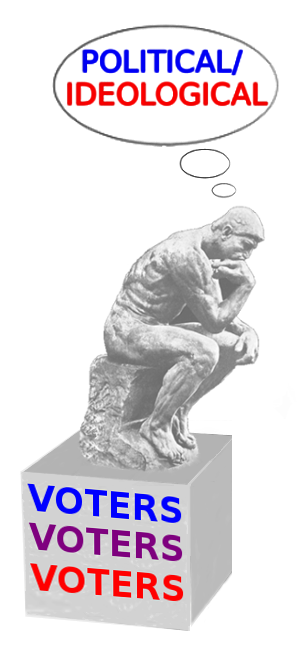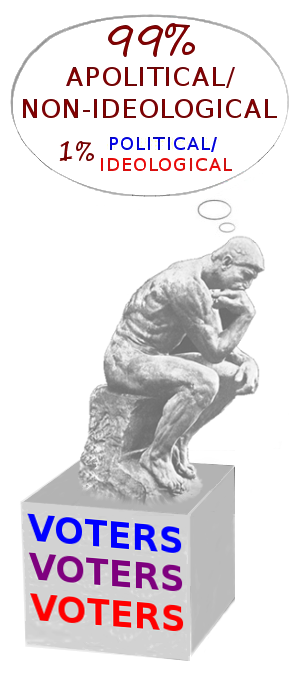| |
.
| Welcome to the home page of |
.png) |
|
 |
 |
"Necessity is the mother of invention"
A brief primer on the
Apolitical/Non-Ideological Model of Self-Governance
and the theory upon which it is based |
|
PLEASE NOTE:
This page currently consists of a hodgepodge of unedited material, some of which is still in the back-of-the-envelope stage of development.
Most of the ideas explored here will be used in a part-(layman's) political science, part-"civic" advocacy book -- working title: First, Re-educate All The Political Scientists and Civics Teachers! -- tentatively scheduled to be published in fall/winter 2015.
The information is being offered now, in raw form, for those of you who want to explore the concept of apolitical/non-ideological-based self-governance immediately rather than have to wait until the book becomes available.
fyi: civic and ANI are used interchangeably.
.
|
| |
cover A

|
cover B

|
| |
.
A special note to:
- young political scientists just starting out in academia and elsewhere;
- political science majors, current and future;
- civics teachers, current and future.
The ANI Model of Self-Governance, and the theory it is based on, represent an entirely new category of "political" knowledge, as well as a radically different way of thinking about the process of self-governance.
As will soon be abundantly clear, this new apolitical/non-ideological-, or civic- based knowledge runs counter to our nation's prevailing political/ideological orthodoxy.
Unfortunately, any knowledge that undermines long standing orthodoxies tends to be rejected by the "establishment" (i.e., anyone with a vested or economic interest in perpetuating the status quo) -- even orthodoxies founded on ignorance-based theories.
This means (assuming history is a guide) that the initial reaction of today's established political scientists -- along with professional political analysts and consultants in media and elsewhere -- will be to reject this new theory's tenets, validity, relevance, feasibility, etc..
That doesn't mean you have to. After all, the ANI model isn't just about a new theory of self-governance. It's about vastly improving the quality of life of an entire nation's people.
That prospect should be of especial interest to those of you who are members of America's youngest generations, since, of all our nation's generations, it will be yours who will face the most difficult and uncertain of futures if America's political/ideological status quo remains unchanged.
.

The subfield that should have been
.
Political thinkers have been analyzing and comparing different forms of government, including different types of democracies, since the time of Aristotle. But Comparative Politics as an "official" subfield of political science only goes back about 80 years.
| comparative politics: |
the comparative analysis of political institutions and processes.
(journal of comparative politics) |
For a host of reasons well worth exploring at another time, it did not occur to our political scientists to create a companion subfield, Comparative Self-Governance, when they created Comparative Politics.
| comparative self-governance: |
the comparative analysis of models and theories of self-governance, principally: |
| |
-- the Political/Ideological (PI) Model/Theory --> the model our voters use
-- the Apolitical/Non-Ideological (ANI) Model/Theory --> the model they should use |
In my view, future historians will judge this to be one of history's most costly intellectual oversights.
Why? Because, had our political scientists formally undertaken the study of comparative self-governance, it would have quickly become obvious to them that the model of self-governance they, along with America's civics teachers, had been teaching their students (and our voters) to use, the PI Model -- particularly and especially to elect Congress's 535 members -- was vastly inferior to the ANI Model inasmuch as America's myriad of major economic, financial, fiscal and societal (EFFS) problems could be traced back to our voters using the former rather than the latter to "practice" democracy.
Not some of our EFFS problems, mind you, but all of them.
In fact, a compelling case can be made that, had America's voters started using the ANI Model to elect their U.S. House and Senate members -- as recently as, say, the 1970's -- America in 2015 would be the closest thing to a Utopia it is possible for any nation to be (given our species' many innate flaws).
Just how close?
For starters, as already mentioned: no EFFS problem large enough or severe enough to constitute a national issue for voters.
That means no hollowed-out middle class problem; no chronic unemployment problem; no severe income inequality problem; no 2% growth rate is the new normal problem; no massive budget deficits as far as the eye can see problem; no crushing national debt problem; no crumbling infrastructure problem; no intractable "inner city" problem -- i.e., no extreme poverty, no rampant violence; no cradle to grave government dependence, no 80% out-of-wedlock birthrate, no public schools stymied by unsocialized and/or uneducable children -- no "Black Lives Matter" problem; and on and on.
FYI: that's why, once our academicians and intelligentsia begin debating the merits of creating Comparative Self-Governance -- not just future historians, but our current historians, will readily agree that this 80 year oversight by our best and brightest political thinkers was one of history's costliest.
“If you control the language, you control the argument.”
George Orwell, 1984
NEW KNOWLEDGE ALERT!!! .
Language that reframes the process self-governance in Apolitical/Non-Ideological (ANI) terms.
.
dysfunctionalizing legislation: legislation which contains one or more provisions, or is written in its entirety, to directly or indirectly advance the self-serving interests of the legislator(s).
For example, legislation that, either whole or in part:
- appeases, rewards, or "addicts" to government largesse, a legislator's favored special interest, vested interest or political interest group(s).
- punishes one or more of the other political party's clique of special, vested or political interest groups.
- increases the legislator's political power.
- increases the legislator's chances of re-election.
- if a member of the party out-of-power, increases the legislator's party's chances of becoming the majority party in the next election cycle; if a member of the majority party, increases the likelihood that the legislator's party remains the majority party.
Two important FYIs re. dysfunctionalizing legislation:
- Over time (decades/generations/centuries) the accumulation of dysfunctionalizing legislation leads to the dysfunctionalization of a democratic society's major systems:
- Free Market system
- Federal Tax system/code
- Financial system
- Healthcare system
- Public Education system
- Welfare system
- Criminal Justice system
- Mental Health system
- Immigration system
- etc.
- As a general proposition, 1) a democracy's major economic, financial, fiscal and societal* (EFFS) problems should be seen as symptoms of that democracy's dysfunctionalized systems rather than the fault of a governing philosophy -- e.g., liberalism or conservatism -- and 2) the greater the system's dysfunctionalization the more numerous and severe the EFFS problems associated with it.
* notable societal problems:
- multi-generational government dependency
- chronic poverty
- long term unemployment
- permanent underclass
- high rates of teen pregnancy and out-of-wedlock births
- single parent/fatherless households
- absence of positive male role models/authority figures
- gang activity/violence
- racial strife/friction
- extremist political/ideological (PI) rhetoric
- PI-rooted animosity
| |
nexus between America's dysfunctionalized systems
and the severity of America's EFFS problems |
|
| |
|
x-axis: degree of dysfunctionalization/optimization of America's systems
y-axis: severity of America's EFFS problems

The more optimized our systems, the less severe our EFFS problems
|
.
|
FYI: Our current tax code is the text book example of what the accumulation of decades/generations of dysfunctionalizing legislation produces.
| |
At 72,000+ pages and growing, USA Today called it a "monstrosity of complexity" when it was only a 54,000 page monstrosity.
- It's sheer size and complexity suppresses economic growth.
- It benefits the politically well connected.
- It gives Big Business an unfair advantage over small and mid-sized companies.
Because it taxes production, it has played a major role in devastating America's low- and mid-skill manufacturing sectors.
- It is the means through which politically ambitious politicians (PAPs) wield their political power and peddle their influence.
- It is how PAPs exert control over every business and nearly every individual in America.
- It is where PAPs hide special favors for their political, corporate and special interest cronies.
- It is why special interest groups and BIG Business treat PAPs like royalty rather than the people's servants.
Our tax code is a major reason Washington is known internationally as a cesspool of political sleaze, greed and dishonesty.
- It destroys integrity and political courage.
- It has turned our PAPs in Congress into high priced prostitutes.
- It is why our nation's Capitol is infested with powerful corporate lobbyists.
- It helps keep the super wealthy... super wealthy???
aside: given the size of our tax code, you can imagine what
170,000+ pages of dysfunctionalizing federal regulations look like.
|
This is what 72,000 pages looks like |
optimizing legislation: legislation that: 1) contains no self-serving provisions, and 2) whose focus is optimizing one or more of a nation's systems.
FYI: Here is what an optimizing tax code would look like.

| |
| |
FOOD FOR THOUGHT:
DESIGNING THE "IDEAL" TAX CODE
|
|
|
| |
| If we define an "optimized" tax code as a tax code that creates the optimum conditions for producing the greatest possible amount of : 1) sustained, muscular economic growth, and 2) new job creation -- particularly good paying high-, mid-, and low-skill manufacturing jobs -- then an optimized tax code is an example of: |
a. a government solution
b. a free market solution
c. a political/ideological (PI) solution (i.e., liberal, conservative)
d. an
apolitical/non-ideological (ANI) solution
answer: d
|
| |
fyi: the same answer applies to an: |
| - |
optimized free market system |
| - |
optimized healthcare system |
| - |
optimized public education system |
| |
 . . . . . . . . . . |
|
"Power is such a dangerous thing that ideally it should be wielded by people who don't want to use power, who would rather be doing something else, but who are willing to serve a certain number of years as a one-time duty...."
Thomas Sowell
PAC/PAP: politically ambitious candidate/politically ambitious politician.
practice democracy: to engage in the process of self-governance.
practicing democracy competently: in America's case, the ability of America's voters to keep Congress filled with a steady supply of "civic"-minded legislators (CMLs) -- i.e., liberal Democrats and conservative Republicans who: 1) don't have a politically ambitious or power hungry bone in their body, and 2) serve in Congress for a few years as a one-time civic duty.
| |
FOOD FOR THOUGHT:
THE IDEAL CIVIC-MINDED CANDIDATE/LEGISLATOR (CMC/CML) |
| |
.png)
For obvious reasons the ideal civic-minded legislator must have a high POM rating. For equally obvious reasons he or she must have a high CTG (capacity to govern) rating as well.
Meaning he or she must:
- be exceptionally intelligent, well educated and knowledgeable,
- be old enough to have accumulated:
- a considerable amount of meaningful life experience (because that's where qualities like wisdom and sound judgment come from), and
- a respectable level of economic/financial success in life,
- possess demonstrated leadership/decision making qualities.
fyi: millions of Americans possess both high POM and CTG ratings.
Given these criteria, we can expect to see a high percentage of legislator candidates coming from the ranks of:
- doctors,
- engineers,
- mid to upper level business executives,
- high ranking military officers,
- etc..
IMPORTANT FYI: there will be a great deal of debate among our intelligentsia (and voters) over the wisdom of electing lawyers to Congress because of that profession's inherent conflict of interest -- i.e.,
- more laws = more work for lawyers;
- fewer laws = less work for lawyers;
- simple, straightforward, commonsense laws = fewer lawsuits = less need for lawyers;
- complex, convoluted laws = more lawsuits = greater need for lawyers.
|
Principle of Systems Optimization:
- Every system over which the federal government has statutory or regulatory authority is optimizable via ANI-based legislation (i.e., technical, data-driven legislation) which will produce economic, financial, fiscal and societal (EFFS) outcomes that large majorities of every PI and demographic group will deem highly desirable.
- Only a national legislature controlled by CMLs has the collective purity of motive (POM) needed to enact optimizing legislation.
Shared ANI objectives: objectives achieved via optimizing legislation that the vast majority of America's 140 million voters would like to see Congress accomplish.
For example, an OPTIMIZED:
- Free Market system
- Federal Tax system/code
- Financial system
- Healthcare system
- Public Education system
- Welfare system
- Criminal Justice system
- Mental Health system
- Immigration system
- etc.
(see complete list of terms below right) |
| |
Introducing the Holy Grail of Self-Governance
into
America's marketplace of new ideas...
If our instructors in America's medical colleges could teach their medical students how to cure, say, cancer of every form -- or a major killer like heart disease -- you can rest assured that they would, and they would do it in a heartbeat (no pun intended).
Unfortunately they can't because that knowledge does not yet exist. But it's probably just a matter of time considering: 1) the amount of knowledge that has been amassed in the medical field in recent years alone, and 2) the countless thousands of medical researchers in America and around the world who are hard at work finding cures at this very moment.
Likewise, if today's rocket scientists knew how to build a spaceship that could get us to Mars and back in, say, a few days they would be hard at work teaching their students in our colleges and universities how to accomplish that feat. And, like their fellow scientists in the medical field, we know that, as you are reading this, there are literally thousands of rocket scientists around the world working to do just that.
Similar examples in other scientific fields abound -- all of which suggests is that if our nation's political scientists suddenly came upon an easy to understand, simple to use method or process which would enable our nation's voters to start practicing democracy competently -- then we have to believe that, minimally, a critical mass of our political scientists would be more than eager to do just that.

more to follow..... |
|
GLOSSARY
acronyms:
CMC/CML: civic-minded candidate/legislator
EFFS: economic, financial, fiscal & societal
NLEP: national legislative election process
PAC/PAP: politically ambitious candidate/politician
POM: purity of motive
terms and concepts:
Eventually, an entire encyclopedia of new civic-based terms and concepts will have to be created to explore and analyze this new subfield.
The following should be viewed as working terms and definitions.
civic-minded: free of political ambition/powerlust.
comparative self-governance: the comparative analysis of models and theories of self-governance -- principally the PI Model and ANI Model.
cooperative voting: voters from different political parties using their respective primary processes to field candidates with the same apolitical/non-ideological characteristics that the voters, regardless of their political/ideological views or governing philosophy, deem highly desirable -- e.g., high POM rating.
fyi: cooperative voting is a civic means to a civic end -- e.g., systems optimization (see below).
dysfunctionalized democracy: a democracy whose major systems are dysfunctionalized (to varying degrees).
aside: in terms of self-governance, a democracy in which voters use the PI Model of S-G to select and elect candidates to their national legislature.
dysfunctionalization rule: an advanced democracy's major economic, financial, and societal problems are the symptoms of her dysfunctionalized systems, with the number and severity of the problems proportional to the number of dysfunctionalized systems and the degree of their dysfunctionalization.
making civic love: slang for cooperative voting; voters using the primary process to field CMCs.
optimizing legislation: legislation:
- that is apolitical and non-ideological -- i.e., not identifiable as Democratic, Republican, liberal or conservative legislation (or a government or free market solution), and
- whose "overarching design objectives" will enjoy widespread support among the general public,
regardless of:
- political affiliation
- ideological views
- income
- education
- age
- race
- gender
- religious beliefs
- sexual orientation
- etc..
optimized democracy: a democracy whose major systems are optimized -- e.g.:
- federal tax system/code
- financial system
- free market system
- healthcare system
- public education system
- welfare system
- criminal justice system
- mental health system
- immigration system
POM rating: a measure of the probability that, once in office, a legislator's legislative and policymaking decisions will NOT be influenced by political ambition, powerlust or other self-serving considerations.
| |
ALL PACs and PAPs have a zero POM rating.
CMCs and CMLs have a high POM rating. |
Principles of Systems Optimization:
- Every system over which the federal government has statutory or regulatory authority is optimizable via apolitical/non-ideological legislation.
- Only a national legislature controlled by CMLs has the collective POM needed to enact optimizing legislation.
Principles and/or Characteristics of Political Ambition:
- the higher the elected office, and the longer the time in office, the greater the political ambition/powerlust.
- the greater the political ambition/powerlust, the greater the willingness to engage in unethical/immoral behaviors and activities to stay in elected office, especially the national legislature.
- Examples of unethical/immoral behaviors and activities:
- special interest pandering/cronyism
- political cronyism (e.g., patronage)
- vested interest cronyism
- demagoguery
- political finger-pointing
- etc.
- the greater the unethical behaviors, the greater the EFFS harm to the nation (via dysfunctionalizing legislation).
science of civic democracy (or science of competent self-governance): the study of the means by which a free society's voters are able to achieve their universally shared ANI objectives.
|
| |
| |
What will be the most frequently asked questions?
Do we possess the technical, economic, financial, sociological, etc. knowledge needed to optimize America's major systems based on overarching "design objectives" which are worded broadly enough that substantial majorities (75+%) of our nation's liberal, moderate, conservative and libertarian voters will strongly support them, but with enough specificity that the legislative language which will achieve those objectives can be written (with relative ease) by CMLs?
Yes
Why can't voters just start electing liberal Democratic and conservative Republican politicians who campaign on the promise of working to optimize our major systems if elected/re-elected?
Because politicians lack the POM needed to even discuss (honestly and sincerely), much less craft and pass, optimizing legislation.
Two important "civic" -- or ANI -- hypotheses for advanced democracies in the Information Age:
- The way a society thinks about the process of self-governance will determine the model of self-governance its voters use to practice democracy.
- The model of self-governance voters use will be the single greatest determinate of both the number and severity of their nation's EFFS problems.
Without this new subfield, America's cognitive elite in academia, media, think tanks, philanthropies, etc. -- along with our nation's students and voters -- will continue to have a one-dimensional understanding of the process of self-governence.
FYI: and, by now, we are all painfully aware of the myriad of consequences of our society's civic, or ANI, ignorance:
|
| |
 |



.
. |
POLITICAL/
IDEOLOGICAL
MODEL
OF
SELF-
GOVERNANCE
.
. |

.
. |
DYSFUNCTIONALIZED:
- Free Market system
- Federal Tax system
- Financial system
- Healthcare system
- Public Education system
- Welfare system
- Criminal Justice system
- Mental Health system
- Immigration system
- etc.
.
.
|

.
. |
.
- inefficient free market system
- government/business cronyism
- regulatory favoritism
- weak/sporadic economic growth
- "prosperity" inequality
- chronic/systemic unemployment
- political gridlock
- crippling national debt
- deteriorating, third world infrastructure
- increasingly poorer middle class
- rapidly growing underclass
- accelerating social decay
- INCREASING government
- control
- cronyism
- corruption
- unaccountability
- INCREASING bureaucratic:
- power
- intrusiveness
- ineptitude
- less economic justice
- less individual freedom
- etc., etc., etc.
|
| |
With this new subfield, our society will quickly acquire a two-dimensional, knowledge-based understanding of the process of self-governence -- along with its many and substantial benefits. |
| |
 |



.
. |
APOLITICAL/
NON-
IDEOLOGICAL
MODEL
OF
SELF-
GOVERNANCE
.
. |

.
. |
OPTIMIZED:
- Free Market system
- Federal Tax system
- Financial system
- Healthcare system
- Public Education system
- Welfare system
- Criminal Justice system
- Mental Health system
- Immigration system
- etc.
.
. |

.
. |
.
.
- extraordinarily efficient free market system
- nonexistent cronyism
- regulatory fairness
- sustained, muscular economic growth
- broad based prosperity
- (true) FULL employment
- political consensus building
- shrinking/non-existent national debt
- world class infrastructure
- strong/vibrant middle class
- shrinking/non-existent underclass
- vibrant, social pathology-free "inner cities"
- exceptional social cohesion
- accountable government
- bureaucratic:
- efficiency
- effectiveness
- competence
- maximum economic justice
- maximum individual freedom
- etc., etc., etc.
|
|
| |

|
|
ABOUT
| Name: |
Montie Rainey |
| Residence: |
West Tennessee |
| Education: |
BS, Mathematics and Computer Science
(University of Illinois at Chicago, 1984) |
| Profession: |
Retired, turned pro-ANI Model advocate |
| Misc: |
Opinion columnist, The Jackson Sun (2005-2010) |
| Contact: |
contact@thinkcivic.com |
|
© Copyright 2015 thinkCIVIC.com. All Rights Reserved.
|
.
.
.
|
|





.png)


